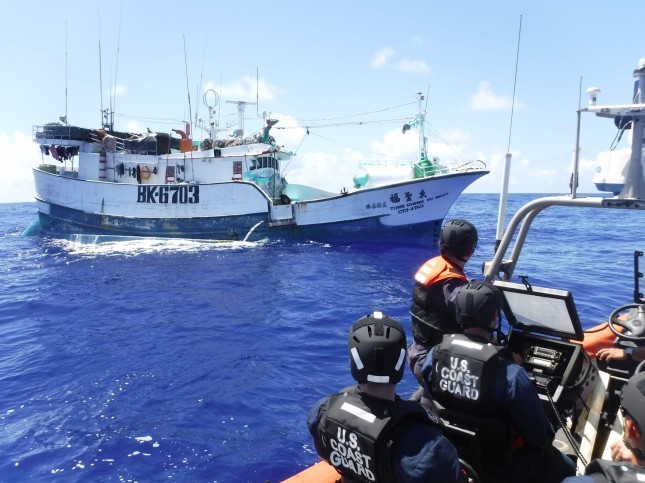-
Tackling Scarcity and Building Security: A Response to IUU Fishing
July 14, 2022 By Johan Bergenas
Last month, as global leaders met in Lisbon for the UN Oceans Conference, President Biden signed a National Security Memorandum to address the challenge of illegal, unreported and unregulated (IUU) fishing. This event is a promising sign that the U.S. and other governments are accelerating the response to the threat that IUU fishing poses—not just to the environment, the economy and human rights, but also to global peace and security.
Marine resource scarcity will increasingly breed violence between communities and countries, especially as global populations grow ever more dependent on fish. That’s why any viable strategy to curb IUU fishing must be two-pronged, promoting solutions that tackle the underlying issues of marine resource scarcity and boost maritime security response.
Fragile Fisheries
Healthy coastal ecosystems support peaceful and well-functioning societies. They feed billions of people, support hundreds of millions of jobs, and provide security to communities at risk from climate change and natural disasters. But today’s oceans are far from healthy. Human activity has devastated marine ecosystems and depleted fish stocks, resulting in more hungry people, increased unemployment, and heightened insecurity for people and societies. It is a recipe for chaos and conflict.
While fisheries conflict could surge in the coming years and decades, it would not be a new development. Between World War II and the end of the Cold War, a quarter of all military conflicts between democracies were fought over fisheries. Since then, the amount of interstate fisheries conflict has increased twentyfold. To understand what’s driving this rapid growth, it’s critical to understand that IUU fishing is, at its core, an issue of natural resource competition. As those resources become increasingly scarce, competition for them boils over into conflict.
Fish is already one of the most rapidly dwindling natural resources on the planet. Two-thirds of our oceans have already been significantly altered by human activity. Over 90% of the world’s fisheries have been pushed to (or beyond) their biological limits. Half of coral reefs and mangroves—which serve as nurseries for juvenile fish and other marine life—have been destroyed. Within 30 years, all of Earth’s remaining reefs and mangroves could be at risk.
Left unchecked, this crisis is only going to worsen. The global human population is expected to grow by two billion by 2050, with demand for fish and other aquatic food on course to nearly double during that time frame.
Climate change compounds the problem. According to a University of British Columbia study, 23 percent of fish stock connected to territorial waters will migrate as a result of climate change in the next eight years. That percentage is expected to double by the end of this century. This climate-driven migration will create newly fish-rich and fish-poor areas that present fresh challenges for coastal communities and nations.
Getting Ahead of Conflict
Scarcity fuels conflict, and conflict in turn drives more scarcity. IUU fishing degrades our oceans by enabling unsustainable practices at industrial scale. This clearly devastates domestic fishing industries, and further depletes a critical resource that billions of people depend on for sustenance. Yet its ripples extend further. IUU fishing also breeds government corruption, and contributes to unsafe and unethical labor practices—including “sea slavery” and other human rights abuses.
There is no path to arresting IUU fishing that doesn’t address the issue of our unhealthy oceans and declining fish stocks. To that end, nations have an opportunity to join the 30×30 movement and commit to conserving and sustainably managing 30 percent of their marine areas by 2030. Ideally, nations would then follow through on that commitment by implementing a blue foods agenda that both meets their food security needs and also fosters inclusive ocean governance and the effective protection and management of their ocean areas.
When it comes to curbing IUU fishing and associated conflict, knowing where and when it will boil over is half the battle. That’s why it’s also vital to develop predictive analysis of future fish conflict based on climate, fisheries, and geopolitical data and analysis.
Such analysis could provide the basis for an early warning system for conflict and food insecurity, and usher in a new era in which maritime security resources are leveraged to deter and prevent future fish wars. Technology capacity building resources, enforcement support and intelligence systems would be key components of such a system. There is also a great need for the maritime security and ocean conservation communities to leverage one another’s resources and competencies through innovative partnerships.
The time to get ahead of looming conflicts over this vital resource before it sparks a shooting war. As U.S. Defense Secretary Lloyd Austin has said, “it’s always better to stamp out an ember than to try to put out a blaze.” Now is the time for innovative conservation and peacebuilding solutions that address the intersecting crises of environmental degradation and conflict. This fire is rising, but the conservation and maritime security communities can work together to stamp this threat out before it is too late.
Johan Bergenas is Senior Vice President of Oceans at World Wildlife Fund (WWF)
Sources: White House; International Studies Quarterly; IPBES; United Nations; Nature; Global Change Biology
Photo Credit: A boarding team from the USCGC Sequoia conducts an IUU fisheries patrol in the Pacific Ocean, courtesy of flickr user Coast Guard News, Photo Credit: U.S. Coast Guard photo by USCGC Sequoia/Released.
 A Publication of the Stimson Center.
A Publication of the Stimson Center.



